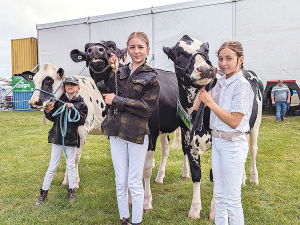Despite farming in one of the most environmentally-sensitive districts, close to Te Waihora/Lake Ellesmere, Clyde McIntosh says the farm has been given an A consent which means it needs environmental re-assessment only every three years.
The farm uses fish and seaweed fertilisers and lime, but no synthetic fertiliser or chemical ‘cides.
“Lake Ellesmere is only a mile away from the bottom of our farm, but we’re running a regenerative system so we’ve been using no chemicals or inorganic fertiliser for 15 years now.”
McIntosh says the transition wasn’t hard at all and the regenerative model now gives him a cost structure that protects him from some of the current rising costs for farmers.
However, with no local buyer for organic milk their product is just going into the Fonterra pool, without attracting the premium for organic milk available elsewhere.
The milking platform is 150ha effective, winter milking 300 cows with a split calving in autumn and spring, and the herd peaks at 450.
The McIntoshes aim to produce between 520 kgMS and 540 kgMS/cow/year. They also have a 75ha supplement/runoff block next to the milking platform which is used to grow grass silage, baleage and hay as well as grazing dry stock whether autumn calvers or spring calvers.
As a fifth-generation Canterbury farmer, McIntosh breeds Holstein-Friesians under the name Riverbrae Stud, founded by the family in 1938.
The family also has a long association with the Christchurch A&P Show, now the New Zealand Agricultural Show.
McIntosh said that in 1898 when horses provided the literal horsepower on farms and Clydesdales were “very big,” a McIntosh horse by the name of Roseberry was judged the Champion Clydesdale Stallion at the Christchurch show.
McIntosh’s father was a past show president and he himself is now on both the general and cattle committees as chairman of the dairy section.
The family tradition continued this year with their three daughters all showing animals.
McIntosh said the girls, Maggie, 12, Olive, 10, and Peggy, 8, were heavily involved in choosing and preparing the animals for the show – picking those with good conformation, then grooming with a straight clipping of the hair along the topline, aided with a little hairspray.
On the first day of the show they came away with one fourth-place ribbon - while Olive cheerfully admitted to a sore arm from having to hold her animal back from running around the judging ring. “She thinks it’s a race.”
The girls also did well on the Friday with the youth show which allows young competitors to compete in calf classes, young handlers and junior judging. Maggie got Reserve champion calf for her age group and Olive won the Championship for the young handlers class for her age group.
McIntosh said that the days of huge numbers of entries are gone because of the time and effort required to support the show, but it is still a valuable showcase for breeders to display and sell pedigree stock.
















